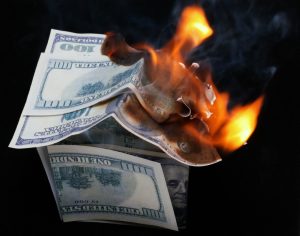Won’t Money Spoil This Thing?
In November of 1937, Bill Wilson and other early A.A. members were asked this question by Albert Scott when they met with him and others in a meeting held in John D. Rockefeller’s private boardroom. The then unnamed fellowship was looking for financial support from Rockefeller for their idea to develop a small specialized hospital to treat alcoholics. In the end, only $5,000 was approved to pay off the mortgage of Dr. Bob Smith’s home and provide a weekly draw of $30 for both Bill and Dr. Bob. Bill was bitterly disappointed at the time because he had envisioned a chain of treatment hospitals staffed with paid A.A. workers.
That wasn’t the end of Bill’s vision for the professionalism of the A.A. way. In his essay on the Sixth Tradition, Bill said “We tried A.A. hospitals—they all bogged down.” He related other outside attempts of education and reform that ultimately led to the conviction A.A. should not endorse any related enterprise, regardless of how good it seemed. “We of Alcoholics Anonymous could not be all things to all men, nor should we try.”
This “school of hard knocks” resulted in the formal acknowledgement of its non-professionalism within the Twelve Traditions. Tradition Six reads: “An A.A. group ought never endorse, finance or lend the A.A. name to any related facility or outside enterprise, lest problems of money, property, and prestige divert us from our primary purpose.” This primary purpose, embodied in Tradition Five, was “to carry its message to the alcoholic who still suffers.” Tradition Seven further voiced what was called A.A.’s “collective poverty” in stating that: “Every A.A. group ought to be fully self-supporting, declining outside contributions.”
The clear language of Tradition Eight states: “Alcoholics Anonymous should remain forever nonprofessional.” Bill began his essay with this paragraph:
Alcoholics Anonymous will never have a professional class. We have gained some understanding of the ancient words, “Freely ye have received, freely give.” We have discovered that at the point of professionalism, money and spirituality do not mix. Almost no recovery from alcoholism has ever been brought about by the world’s best professionals, whether medical or religious. We do not decry professionalism in other fields, but we accept the sober fact that it does not work for us. Every time we have tried to professionalize our Twelfth Step, the result has been exactly the same: Our single purpose has been defeated.
It isn’t too hard to find someone critical of Alcoholics Anonymous or Twelve Step recovery these days. One of these critics is Dr. Lance Dodes, author of The Sober Truth. Dr. Dodes has professional credibility. He is a trained psychoanalyst; a retired assistant clinical professor of psychiatry at Harvard Medical School; the former director of the substance abuse treatment unit of McLean Hospital and more.
Listening to his interview on NPR, you will here him claim that: “the success rate of AA is between 5 and 10 percent.” And then he stated that the studies that have claimed to show that AA is scientifically useful are “riddled with scientific errors.” Further, A.A. is also “harmful to the 90 percent who don’t do well.” Significantly, he noted where A.A. describes itself as a “brotherhood” (or fellowship) rather than a treatment.
A.A. is not treatment, but often gets lumped in with the Rehab industry, as within the subtitle of Dodes’ book: “Debunking the Bad Science Behind Twelve-Step Programs and the Rehab Industry.” Dr. Dodes is just the newest in a long line of critics of both A.A. and the addiction treatment industry. His dismissed studies supporting the usefulness of A.A. as “riddled with scientific errors,” and declared that: “AA probably has the worst success rate in all of medicine.”
Another long time Twelve Step recovery critic is Stanton Peele. Dr. Peele has been around since 1975, when he was the co-author of Love and Addiction. His latest book is Recover! Stop Thinking Like an Addict and Reclaim Your Life with The PERFECT Program. I’ve read several of his other books and found some of his thinking useful. One idea from The Diseasing of America that I’ve used regularly over the years was his distinction between three generations of “disease” (physical ailments, mental disorders, and addictions). You can read his recent thoughts on addiction and recovery in these blog posts on The Fix: “The New Recovery” and “Do Not Fold, Spindle, or Mutilate People into AA.”
Because of its traditions, (Tradition Ten: “Alcoholics Anonymous has no opinion on outside issues; hence the A.A. name ought never be drawn into public controversies.”) A.A. will not respond to these criticisms. So if you want more information on A.A., you’ll have to go to some open A.A. meetings and see for yourself what A.A. is all about. They don’t charge admission; it’s free. You can also subscribe to this blog and receive a free copy of my ebook, “The Age of Miracles is Still with Us,” which examines data from periodic membership surveys by A.A.
If you want to know more about what Drs. Dodes and Peele think about A.A., try their latest books: Recover! for $16.66 or The Sober Truth for $20.50 on Amazon.

